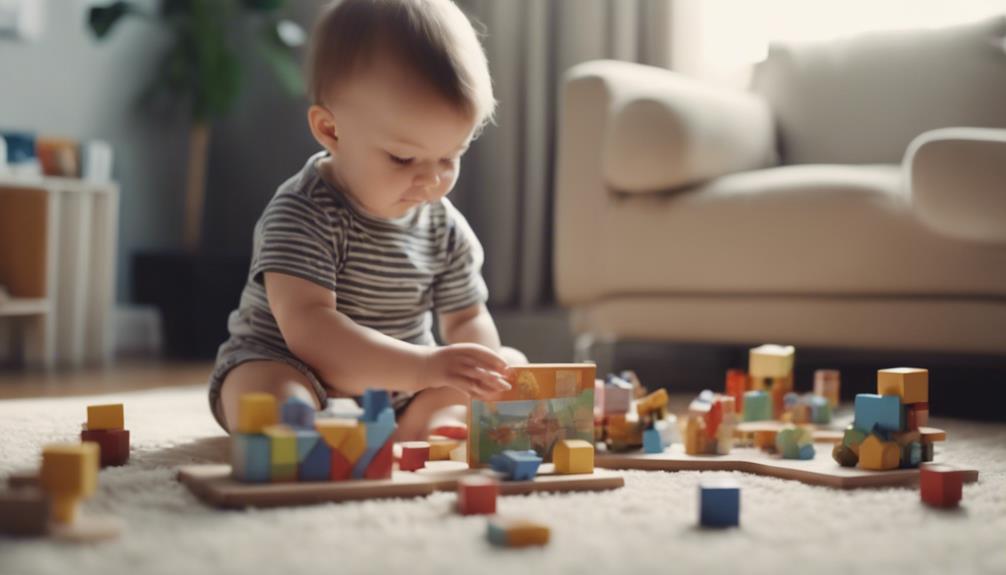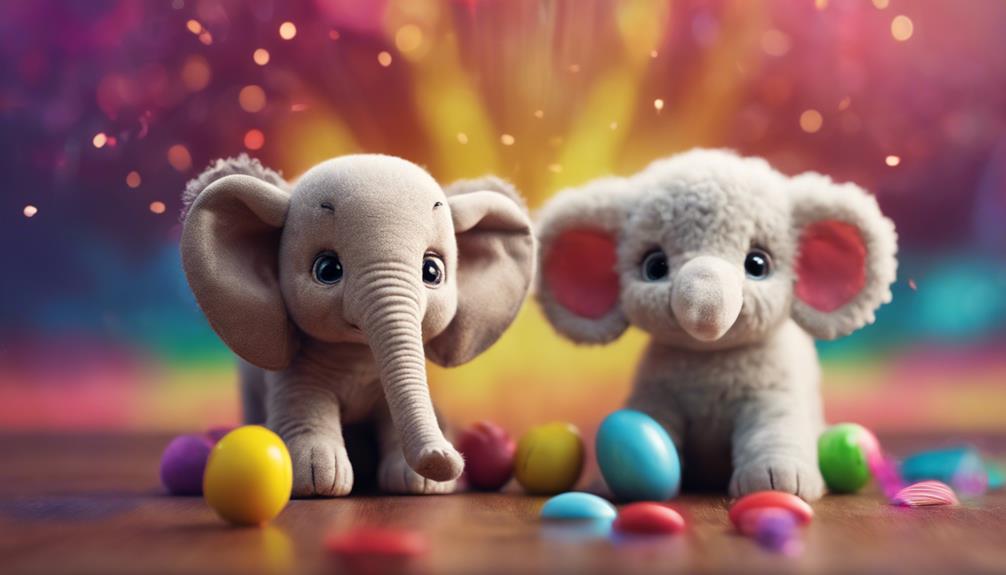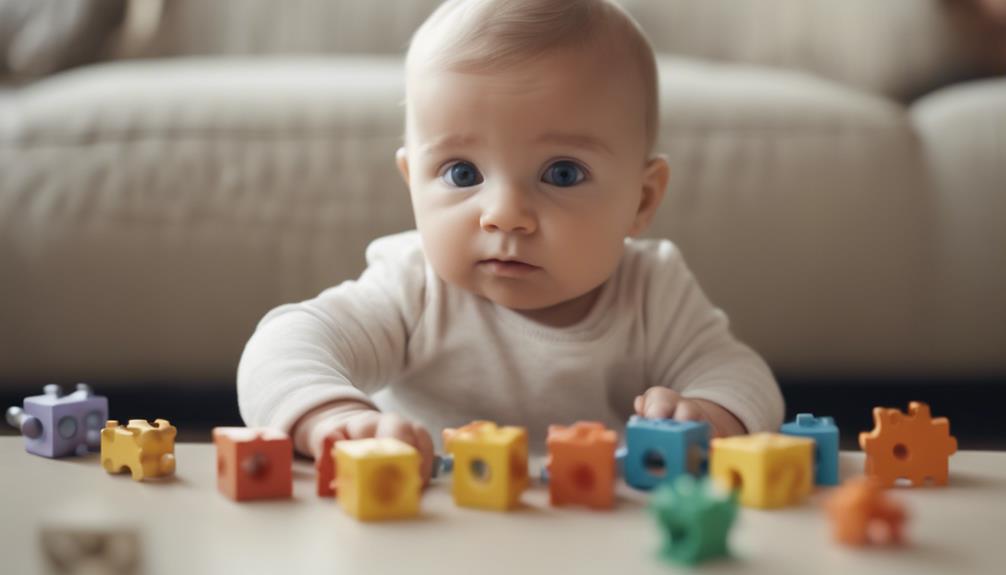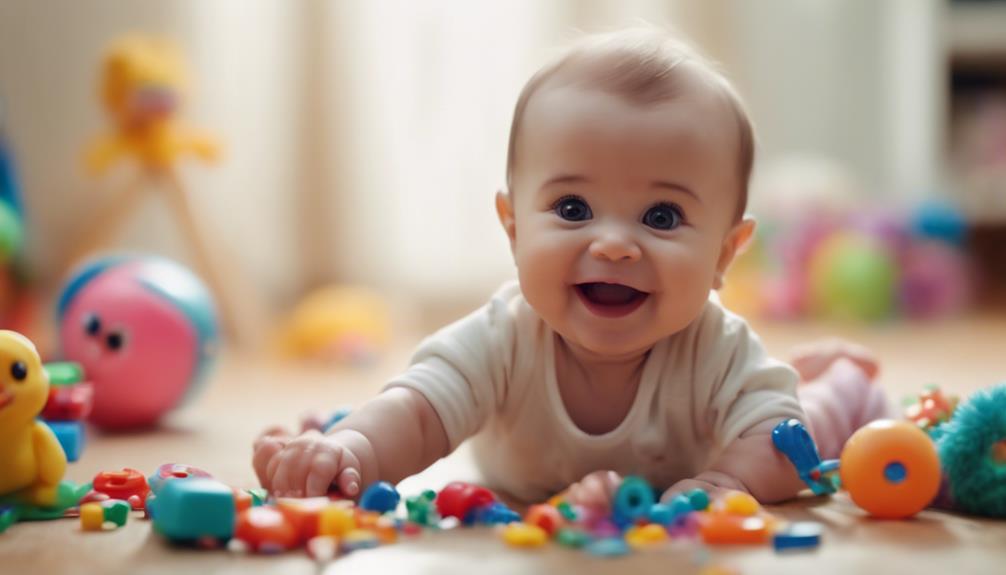Noticing if your baby might be gifted entails looking out for signs of remarkable alertness, advanced motor skills, and early language development. Keep an eye out for exceptional memory retention, curiosity, and rapid learning. Remember to observe sensitivity, social skills, and a talent for creative thinking. If you notice these characteristics, your child could be displaying significant cognitive potential!
Key Takeaways
- Exceptional alertness and active engagement with surroundings.
- Advanced motor skills like early crawling and hand-eye coordination.
- Early language development with vocabulary expansion and communication milestones.
- Excellent memory retention and early signs of cognitive development.
- Curiosity, fast learning abilities, and advanced problem-solving skills.
Exceptional Alertness
If your baby displays exceptional alertness, they may be showing early signs of advanced cognitive development and potential intelligence. This heightened level of alertness in babies is a promising indicator of high intelligence.
When your baby enthusiastically makes eye contact, responds swiftly to stimuli, and shows a strong interest in their surroundings, it could be a sign that their brain is developing at an accelerated pace. Babies who can maintain their attention for extended periods and quickly react to changes in their environment often demonstrate remarkable cognitive abilities.
As you observe your exceptionally alert baby recognizing familiar faces, reacting to sounds promptly, and actively engaging with their surroundings, take pride in their early signs of advanced cognitive development. Encourage this curiosity by providing a stimulating environment that nurtures their inquisitive nature.
Through interactive play, reading, and exposing them to new experiences, you can further support their intellectual growth. Remember, every moment is an opportunity to fuel their budding intelligence and help them flourish.
Advanced Motor Skills
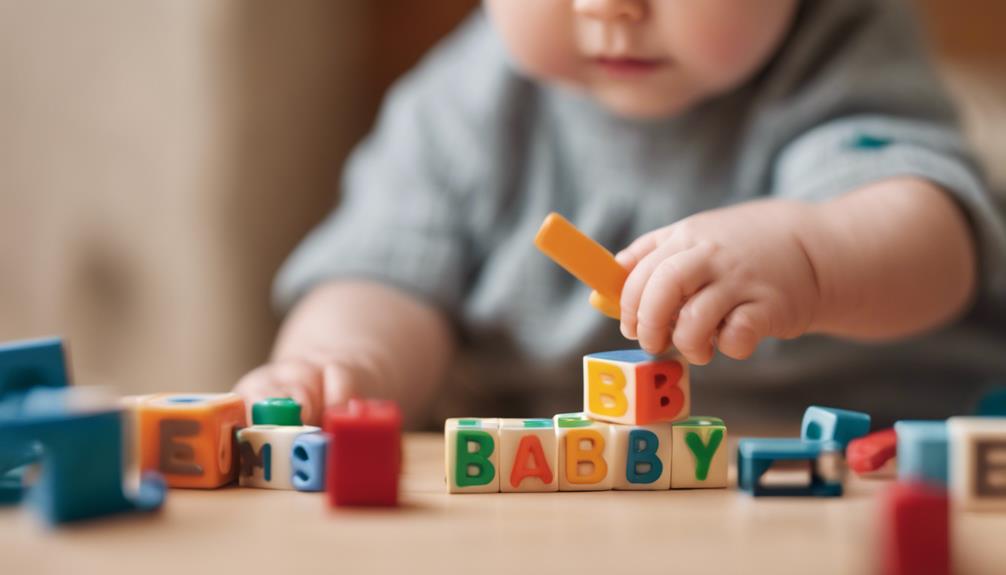
If your baby is showing early crawling abilities or precise fine motor skills, these could be signs of advanced motor skills. Achieving these milestones ahead of schedule might indicate a high level of intelligence.
Encourage their development by providing safe opportunities for exploration and practice.
Early Crawling Abilities
Early crawling abilities in infants may serve as a key indicator of advanced motor skills and potential intelligence. Babies who excel at crawling early on often display exceptional motor skills and a keen interest in exploring their surroundings. Achieving crawling milestones ahead of schedule can suggest heightened cognitive abilities and a natural inclination towards physical development. Not only does early crawling indicate a strong foundation in motor skills, but it also hints at potential giftedness in your little one.
Encouraging your baby to practice crawling by creating a safe and stimulating environment can further enhance their motor skills and cognitive development. Providing plenty of supervised tummy time and opportunities for your baby to move freely can aid in strengthening their muscles and coordination.
Precise Fine Motor Skills
Building on the foundation of early crawling abilities, another key indicator of potential intelligence in babies is the development of precise fine motor skills, also known as advanced motor skills. These skills encompass a range of abilities that can hint at your baby's cognitive potential:
- Early grasping: Babies who show early proficiency in grasping objects with control and purpose might be displaying advanced motor skills.
- Manipulating objects: The ability to manipulate objects with precision and intention could be a sign of exceptional dexterity in your little one.
- Precise hand-eye coordination: Observing your baby's early capability to pick up small objects or stack items with accuracy may indicate advanced motor skills.
- Exceptional dexterity: Babies who demonstrate refined finger movements, like feeding themselves or holding small toys, may be exhibiting giftedness.
- Intricate hand movements: Look for early development of intricate hand movements such as turning pages in a book or fitting objects together, as they could suggest advanced motor skills.
Encouraging these skills through playful interactions and activities can further support your baby's development and potential intellectual abilities.
Early Language Development
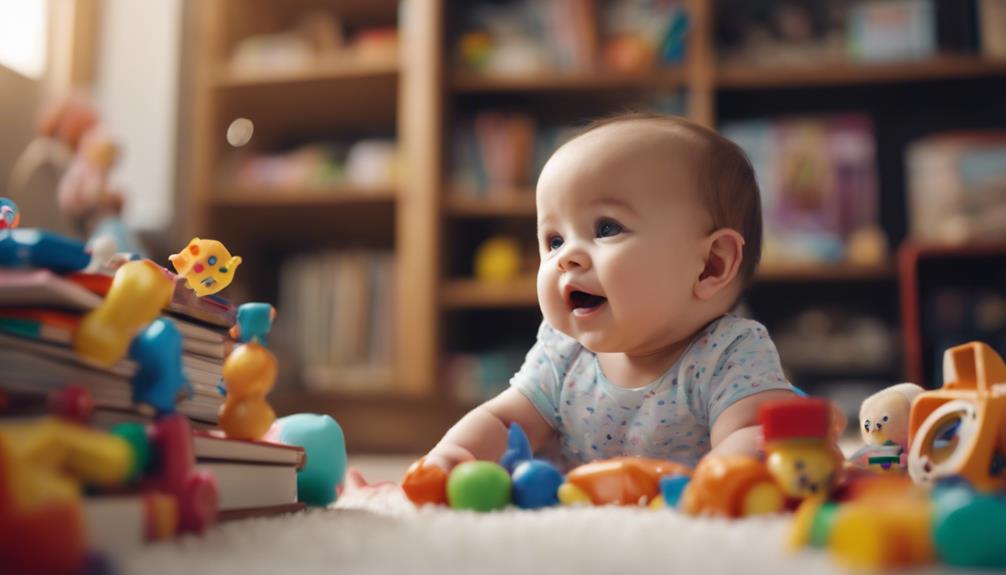
To assess your baby's potential genius, observe their vocabulary expansion and communication milestones closely.
Encourage interactive reading sessions and playful verbal exchanges to nurture their language skills.
Vocabulary Expansion
Expanding your baby's vocabulary early on can be a key indicator of their potential intelligence. By observing their language development, you may uncover signs that suggest a gifted baby in the making.
Here are five emotional cues to help you gauge the progress of your little one's linguistic skills:
- Witnessing your baby's vocabulary expansion is like watching a tiny seed grow into a blooming flower of knowledge.
- Hearing your baby form complex sentences can fill you with pride, knowing that their advanced language development is taking root.
- Noticing your baby recognizing and using intricate words correctly may spark excitement, hinting at their high intellect.
- Seeing your baby display a larger vocabulary and intricate sentence structure might evoke wonder, as they reveal early signs of giftedness.
- Observing your baby's early language skills, such as speaking or forming simple sentences, can be heartwarming, indicating a bright linguistic future ahead.
Communication Milestones
Early language development in babies can serve as a strong indicator of their cognitive abilities and future linguistic skills. Communication milestones like showing interest in words, following verbal directions, and forming sentences at an early age can suggest advanced language development.
If your baby demonstrates a good understanding of instructions, a larger vocabulary, and enjoys listening to books being read, they might've heightened language skills. Mimicking sounds and making efforts to communicate early on could also indicate accelerated language comprehension.
Encouraging these behaviors and providing a language-rich environment can further support your baby's linguistic growth. Keep engaging with your little one through talking, singing, and reading aloud to help nurture their communication skills.
Excellent Memory Retention
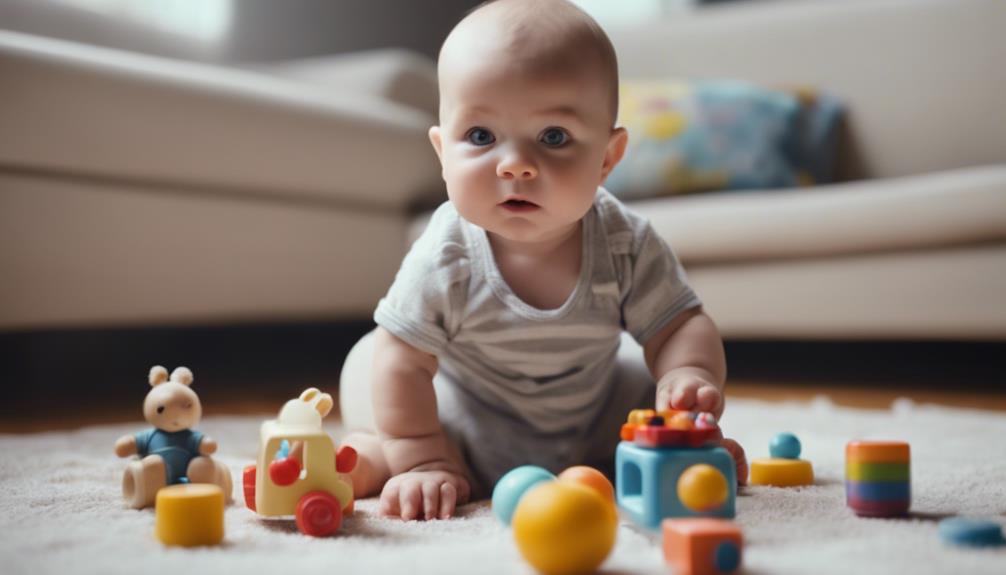
Babies showing exceptional memory retention often exhibit remarkable abilities to recall details, events, or information with impressive accuracy. This advanced memory skill can be a fascinating aspect of your baby's cognitive development.
Here are some emotional cues to help you identify if your baby has excellent memory retention:
- Amazement: Witnessing your baby effortlessly recall past events can leave you in awe of their memory capabilities.
- Pride: Seeing your baby remember faces or routines with precision can fill you with pride for their advanced memory skills.
- Excitement: Discovering early signs of cognitive development through strong memory retention in your baby can be an exciting journey.
- Curiosity: Observing your baby's ability to recall information accurately may spark your curiosity about their potential intelligence.
- Joy: Knowing that your baby possesses exceptional memory can bring joy as you witness their memory skills unfold.
Embrace these moments and nurture your baby's exceptional memory, as it could be a key indicator of their future brilliance.
Curiosity and Fast Learning
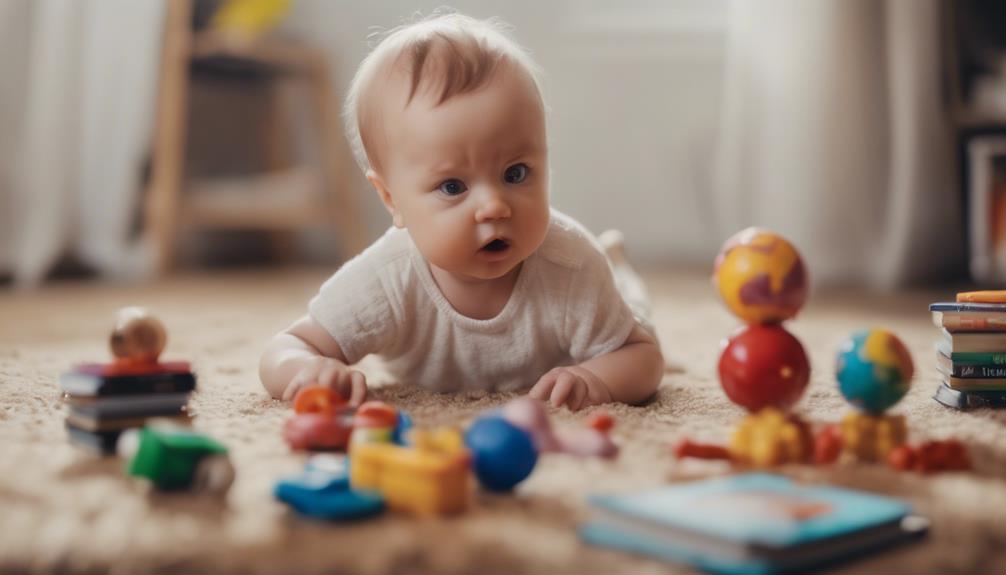
With exceptional curiosity and a rapid ability to learn, gifted infants display remarkable cognitive prowess from an early age. They're always enthusiastic to learn and explore their surroundings, showing a hunger for new knowledge that sets them apart.
Gifted babies ask complex questions and actively seek detailed answers, showcasing their thirst for understanding. Their fast learning abilities are evident in how they engage in activities for extended periods, driven by high energy levels and intense focus. These infants possess advanced problem-solving skills, finding creative solutions and demonstrating resourcefulness early on.
Additionally, their strong memory retention allows them to remember information and experiences with exceptional clarity and detail, aiding in their overall cognitive development. Encouraging and nurturing these traits can further enhance their natural abilities, fostering a love for learning and exploration that will benefit them throughout their lives.
Strong Problem-Solving Abilities
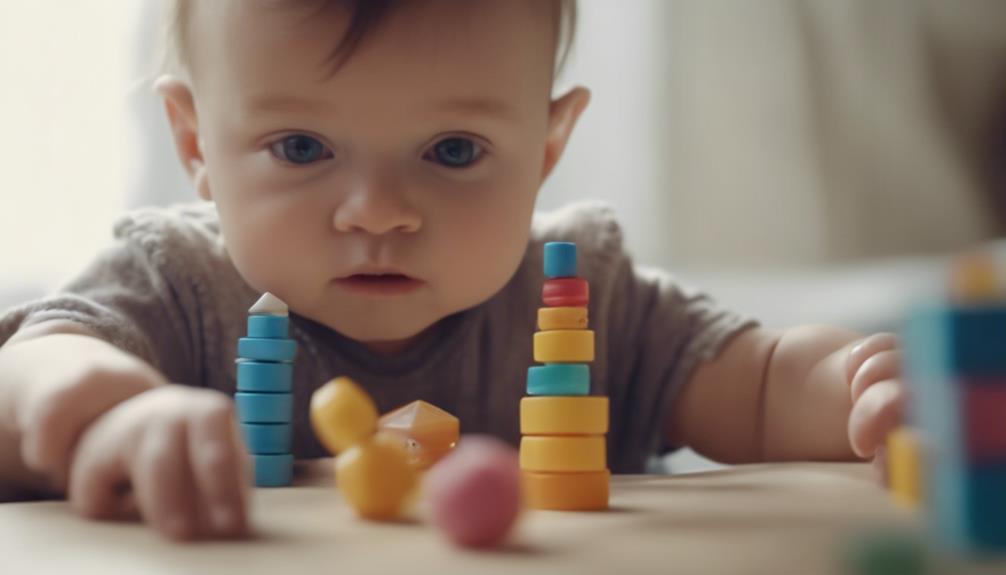
When evaluating your baby's problem-solving abilities, pay attention to their quick puzzle-solving skills, ability to find creative solutions, and resourceful problem-solving tactics.
Encourage their persistence in tackling challenges, as this determination is a key indicator of strong problem-solving abilities.
Quick Puzzle-Solving Skills
A notable indicator of potential giftedness in your baby is the ability to swiftly solve puzzles, demonstrating strong problem-solving skills. Watching how your little one approaches and conquers puzzles can give you a glimpse into their cognitive development and intelligence. Gifted babies often display a natural talent for problem-solving, showcasing their advanced cognitive skills from an early age.
Here are some key points to take into account when evaluating your baby's quick puzzle-solving abilities:
- Pay attention to how your baby tackles new and challenging puzzles.
- Notice if your baby shows persistence and determination when faced with difficult tasks.
- Encourage your baby to explore a variety of puzzles to stimulate their problem-solving skills.
- Celebrate small victories and progress in puzzle-solving, fostering a positive learning environment.
- Remember that each baby develops at their own pace, so be patient and supportive as they enhance their problem-solving skills.
Creative Solution Finding
To further assess your baby's intelligence, observe how they demonstrate their strong problem-solving abilities through creative solution finding. Gifted babies show remarkable persistence when faced with challenges, refusing to give up until they find a solution.
Their vivid imagination allows them to think outside the box, coming up with innovative approaches to problems that others may not consider. Resourcefulness is a defining trait in these babies, as they excel at finding unconventional solutions to even the most complex of problems.
By showcasing these advanced problem-solving skills at such a young age, your baby may be indicating exceptional intelligence and cognitive abilities. Encourage and nurture these talents by providing opportunities for them to explore and experiment with different problem-solving tasks.
Resourceful Problem-Solving Tactics
How do gifted babies demonstrate their strong problem-solving abilities through resourceful tactics?
Gifted babies exhibit advanced cognitive skills by employing creative solutions and resourceful strategies to tackle challenges. Here are some ways to identify these resourceful problem-solving tactics in your little one:
- Persistence: Gifted babies show determination in overcoming obstacles, refusing to give up easily.
- Imaginative Solutions: Their high intelligence often leads them to think outside the box, using imagination to solve problems in unique ways.
- Unconventional Thinking: They approach problem-solving tasks in innovative ways, showcasing their resourcefulness.
- Key Indicator: Demonstrating resourcefulness is a clear sign of a potentially gifted baby with strong problem-solving abilities.
- Nurturing Skills: Encouraging and supporting your baby's problem-solving efforts can further enhance their cognitive development, fostering their natural talents.
Sensitivity and Emotional Intelligence

Babies with high emotional intelligence often exhibit strong connections with people and pets, demonstrating their sensitivity and understanding of emotions. These emotionally intelligent babies can recognize and respond to feelings, showing a level of mature thinking beyond their years.
Sensitivity to emotions and the ability to empathize are key traits in emotionally intelligent babies, allowing them to navigate social interactions with grace and understanding.
To nurture emotional intelligence in your baby, it's vital to encourage emotional expression and validate their feelings. By providing a safe space for your baby to explore and express their emotions, you're helping them develop a strong foundation for understanding and managing feelings as they grow.
Engaging in responsive caregiving, showing empathy, and modeling healthy emotional expression can all contribute to fostering emotional intelligence in your little one.
Advanced Social Skills

Developing advanced social skills in your baby involves fostering empathy, creativity, and a deep understanding of social interactions. Here are some key indicators that your baby may possess advanced social skills:
- Displays empathy: Your baby shows care and understanding towards others, even at a young age.
- Engages in complex pretend play: Encouraging imaginative play can help your baby develop advanced social skills and creativity.
- Shows advanced social interactions: Your baby interacts with peers and adults in a sophisticated manner, displaying a deep understanding of social dynamics.
- Demonstrates leadership qualities: Your baby takes charge in social situations, showing confidence and the ability to connect with others on a deeper level.
- Expresses complex emotions: Your baby is able to convey and understand nuanced emotions, contributing to more profound social interactions.
Preference for Solitary Activities

Indulging in independent play and exploration, your baby's preference for solitary activities may signal advanced cognitive abilities. When your little one chooses to engage in activities like puzzles or building blocks alone, it could be a hint of heightened intelligence and problem-solving skills.
Babies with a knack for independent play often thrive on challenges that stimulate their cognitive development. By seeking out solitary activities, your baby may be honing their ability to think critically and solve complex problems.
Encouraging your baby's preference for solitary activities can further support their cognitive growth. Providing a variety of stimulating toys and activities that promote independent play can help nurture their advanced intellectual capabilities.
Embrace their solo adventures and observe how their focus and determination in independent play reflect their developing cognitive skills. Remember, your baby's preference for solitary activities is a fascinating glimpse into their potential for exceptional cognitive abilities.
Exceptional Creativity
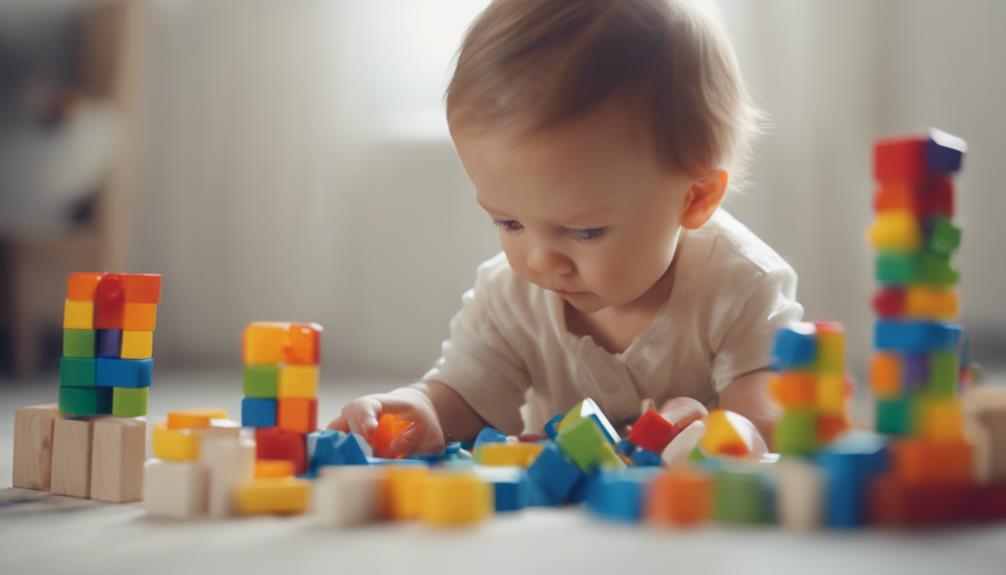
Displaying exceptional creativity and imagination from a young age is a common trait among gifted babies. If your little one is a highly intelligent child, you may notice their love for imaginative play and their ability to come up with unique solutions to problems. Here are some signs that your baby might have exceptional creativity:
- They create intricate scenarios during playtime, showcasing their expansive imagination.
- Gifted babies enjoy exploring creative activities like drawing, storytelling, and inventing games.
- Their knack for thinking outside the box is evident in how they approach challenges.
- Encouraging their creativity through art, music, and imaginative play can further nurture their giftedness.
- Watching them engage in imaginative play can give you a glimpse into their exceptional creativity.
Nurturing this creativity can help your baby thrive and continue to develop their unique talents.
Frequently Asked Questions
How to Identify a High IQ Baby?
To identify a high IQ baby, look for signs like exceptional alertness, advanced motor skills, and early language development. Watch for excellent memory retention, curiosity, and fast learning abilities. Problem-solving skills, sensitivity, and intensity may also indicate giftedness.
How Can You Tell if Your Baby Is a Genius?
You can spot your baby's genius with milestones, sharp memory, early problem-solving, keen curiosity, alertness, focused attention, advanced language, independent play, determination, sensitivity to stimuli, emotional intelligence, and preference for solitude. Your baby is extraordinary!
Do Baby Milestones Indicate Intelligence?
Baby milestones like sitting up early, speaking, problem-solving skills, memory retention, curiosity, focus, and quick learning abilities indeed can indicate intelligence. High alertness, attention span, and cognitive development also suggest your baby's intelligence.
What Does Intelligence Look Like in Infants?
When it comes to intelligence in infants, you might notice early language skills, sharp problem-solving, and strong social connections. Babies with exceptional alertness, empathy, and determination often show the makings of a little genius.
Conclusion
So, is your baby a genius? Look out for signs like exceptional alertness, advanced motor skills, early language development, and more.
Remember, every child is unique and develops at their own pace. Keep encouraging their curiosity and learning, and who knows, you may have a little genius on your hands!
Keep nurturing their talents and abilities, and watch them thrive. The possibilities are endless when it comes to your little one's potential.
Stay curious, stay engaged, and watch them soar!

